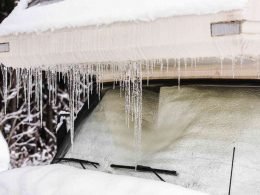Does Your RV Have Hot Skin?
You may be able to dismiss or ignore a slight shock from your RV, but it can present a real danger if it’s a regular issue. This is what’s known as “hot skin.” Learn what it means when your RV has hot skin and what you should do about it.
What Is RV Hot Skin?
If you’ve ever touched your RV and felt a shock, you know what hot skin is. Any RV surface capable of conducting electricity can deliver a shock when you touch it. This shock is what’s known as hot skin. The shock can vary in intensity but is particularly dangerous when you’re barefoot, and the ground is wet.

What Causes Hot Skin on an RV?
There are several causes for hot skin in RVs. Sometimes it’s the power pedestal, but other times it’s the RV itself.
When a campground doesn’t wire power pedestals correctly, it can result in hot skin on your RV. The ground can interrupt the wiring to the pedestal, resulting in stray voltage that travels through the chassis, wheels, hitch, and even the metal skirting on your RV.
While the pedestal can play a role in causing this issue, it’s not the only culprit. Any faulty wiring in your RV can cause hot skin as well. Faulty wiring could result from sub-par craftsmanship or rodents getting into your RV and chewing wires. It could even be from wires rubbing together while bouncing down the highway.
Can Fiberglass RVs Have Hot Skin?
Yes, fiberglass RVs can have hot skin. While fiberglass is an insulator and non-conductive, fiberglass RVs are more than fiberglass. They have steel frames, axles, wheels, bumpers, tongues, door frames, door handles, and even skirting. These metal items will be conductive and can result in an electrical shock.
How to Test for RV Hot Skin
One of the safest and easiest ways to test for RV hot skin is to invest in a non-contact voltage tester. This pen-like tool can detect hums in conductive materials and alert you to a potentially dangerous situation.
Once you’ve got your voltage tester, make sure it’s working correctly. You can do this by gripping it firmly and sticking it into a working electrical receptacle. The voltage tester should light up to indicate it’s detecting voltage.
Then take your voltage tester and touch any metal object on your RV connected to the chassis. The easiest items to touch are the hitch, wheels, or metal steps. If your voltage tester alerts you, immediately unplug your RV from the power pedestal and fix the problem. You shouldn’t touch the RV to check or verify the accuracy of your voltage tester. Doing so can result in serious harm or even death.
RV Hot Skin Can Kill
Any type of electrical shock is a serious situation. The intensity of a shock can vary based on a multitude of factors. There are some instances of people being seriously injured or killed as a result of RV hot skin. A 3-year-old boy was killed as a result of hot skin on his family’s Airstream. Protecting your friends and family from electrocution is critical. Make sure you’re correctly testing your RV for hot skin when you arrive at a campsite.
Do Surge Protectors Guard Against Hot Skin?
No, a surge protector is not enough to guard against hot skin. While a surge protector can protect your RV from surges and even indicate whether your pedestal wiring is correct, it can’t alert you to hot skin.
Not all cases of hot skin are the result of miswired power pedestals. Some hot skin incidents occur due to wires fraying from rubbing together or bad wiring inside the coach itself. These conditions would occur after the testing from the surge protector and pose a very serious situation for anyone who touches the RV.
How to Fix Hot Skin on Your RV
The best way to fix hot skin on your RV is to unplug from the power pedestal to prevent any potential incidents and identify where the problem is. Check the power pedestal first and then any power cables connecting the RV to the power pedestal. If you have yet to identify the cause, begin testing your RV’s components and wiring. You may need to consult a professional, as faulty wiring can be a serious danger.
Eliminating any possibility of hot skin on your RV is essential for ensuring the safety of yourself and your travel companions. If you don’t regularly test your RV for hot skin, you may want to get a voltage tester today. Have you ever been shocked by your RV?
If You Want the Latest Travel News, Join Our Mailing List
Don’t rely on biased RV industry news sources to keep you informed. Stick with Nomadic News. We publish articles and breaking stories that matter to you every weekday.









